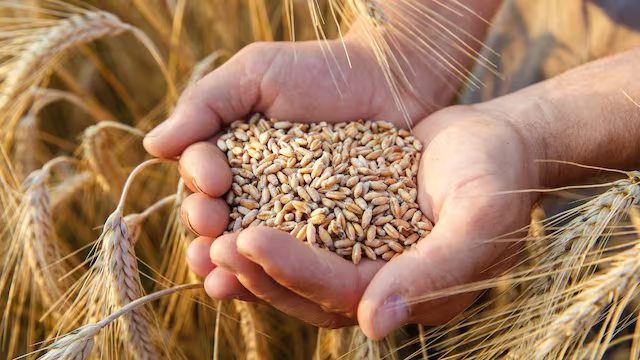welfare. The procurement took place through
5,852 purchase centres, strengthening the state's commitment to both
agricultural growth and
economic sustainability.
1. Record Wheat Procurement: A Milestone for Uttar Pradesh
This year’s procurement marks a remarkable increase in wheat supply from Uttar Pradesh’s agricultural sectors, which are considered one of the most crucial for India’s food grain production. Key highlights include:
- 9.26 LMT of wheat procured, surpassing last year’s procurement targets.
- Over 1.73 lakh farmers benefiting from the procurement process, improving income stability and food security.
- A well-established network of 5,852 purchase centres, ensuring easy access for farmers.
This surge in procurement reflects the state's strategic efforts to enhance wheat cultivation and ensure that farmers receive competitive prices for their produce.
2. Farmer Welfare at the Heart of the Initiative
The Uttar Pradesh government’s procurement drive is part of its broader vision to uplift its agricultural economy and ensure the well-being of farmers. Here’s how the initiative directly impacts farmers:
- Competitive MSP (Minimum Support Price): Farmers receive the MSP for wheat, ensuring fair compensation amidst fluctuating market prices.
- Timely Payments: The government’s streamlined procurement system ensures timely payments, allowing farmers to reinvest in the next planting season.
- Support for Smallholder Farmers: With a growing number of small and marginal farmers included in the procurement process, this initiative promotes inclusive growth.
By making wheat procurement more accessible and financially rewarding, Uttar Pradesh is helping to reduce rural distress and improve the livelihoods of its farming communities.
3. Boosting Food Security for the Nation
Uttar Pradesh plays a key role in India’s agricultural supply chain, being one of the top producers of wheat in the country. The record procurement has a direct impact on national food security, contributing to the central government’s food distribution programs, such as the Public Distribution System (PDS). This procurement drive will:
- Ensure adequate wheat reserves for food security programs.
- Strengthen the nation’s grain stockpile, reducing the vulnerability to food crises.
- Support buffer stock requirements for future grain demand during shortages or price hikes.
A robust wheat procurement system enables India to meet its growing food needs, particularly in challenging times like droughts or global supply disruptions.
4. Streamlining Logistics and Infrastructure for Efficiency
The success of this massive procurement is not just due to increased farmer participation but also the logistical infrastructure that supports it. Key logistical improvements have included:
- Enhanced transportation networks ensuring efficient wheat movement from farms to procurement centres.
- Digital platforms for real-time tracking and monitoring of procurement processes.
- Cold storage and warehouse capacity expansion, enabling the preservation of wheat for longer durations.
These improvements have enhanced supply chain efficiency, reducing delays and wastage, and helping the state manage its agricultural production better.
5. A Template for Other States to Follow
Uttar Pradesh’s record wheat procurement serves as a model for other states to emulate. The lessons learned from its experience in streamlining procurement, improving farmer engagement, and strengthening infrastructure can serve as a framework for other regions to bolster their own food security and agricultural growth initiatives.
Conclusion: A Strong Foundation for Future Agricultural Growth
With the record procurement of 9.26 LMT of wheat this year, Uttar Pradesh has reaffirmed its pivotal role in India’s agricultural economy. The state’s commitment to farmer welfare and food security stands as an example of how focused policy, effective infrastructure, and innovative farmer engagement can drive agricultural progress and improve the livelihoods of millions.
The future of Indian agriculture looks promising, and with continued efforts like this, Uttar Pradesh is well on its way to becoming an agricultural powerhouse, not only in wheat production but in building sustainable, resilient agricultural systems across the country.
.png)
.png)







